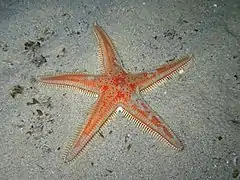Paxillosida
| Paxillosida | |
|---|---|
 | |
| Luidia magnifica | |
| Scientific classification | |
| Kingdom: | |
| Phylum: | |
| Subphylum: | |
| Class: | |
| Order: | Paxillosida Perrier, 1884 |
| Families | |
|
See text. | |
Characteristics
Paxillosida adults lack an anus and have no suckers on their tube feet. They do not develop the brachiolaria stage in their early development.[1] They possess marginal plates, and have sessile pedicellariae. They mostly inhabit soft-bottomed environments of sand or mud.[2]
Systematics
Recent analyses suggest Paxillosida may be a sister taxon of Asterina.[1] The order is divided into these families:[3]
- family Astropectinidae Gray, 1840
- family Ctenodiscidae Sladen, 1889
- family Goniopectinidae Verrill, 1889
- family Luidiidae Sladen, 1889
- family Porcellanasteridae Sladen, 1883
- family Pseudarchasteridae
- family Radiasteridae Fisher, 1916
References
- Matsubara, M., Komatsu, M., Araki, T., Asakawa, S., Yokobori, S.-I., Watanabe, K. & Wada, H. (2005) The phylogenetic status of Paxillosida (Asteroidea) based on complete mitochondrial DNA sequences. Molecular Genetics and Evolution, 36, 598–605
- Barnes, Robert D. (1982). Invertebrate Zoology. Philadelphia, PA: Holt-Saunders International. p. 948. ISBN 0-03-056747-5.
- MarineSpecies.org - Paxillosida Perrier, 1884
This article is issued from Wikipedia. The text is licensed under Creative Commons - Attribution - Sharealike. Additional terms may apply for the media files.

.jpg.webp)





_(4338628827).jpg.webp)
